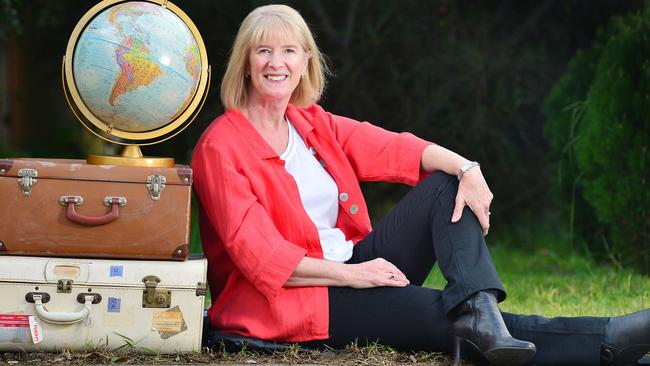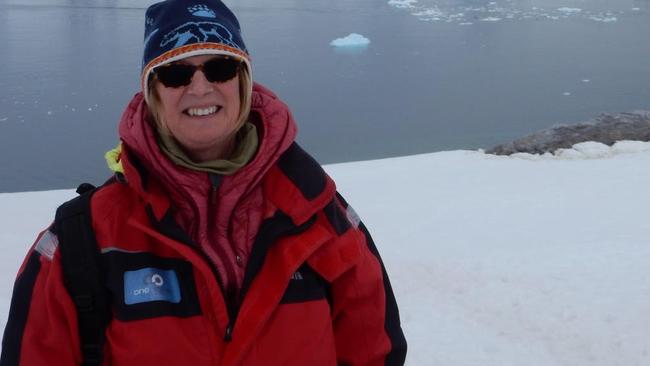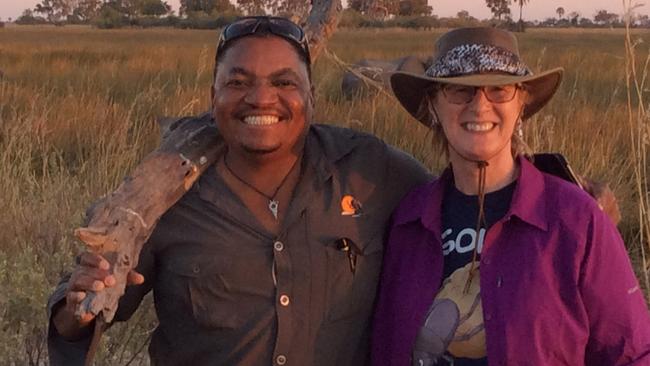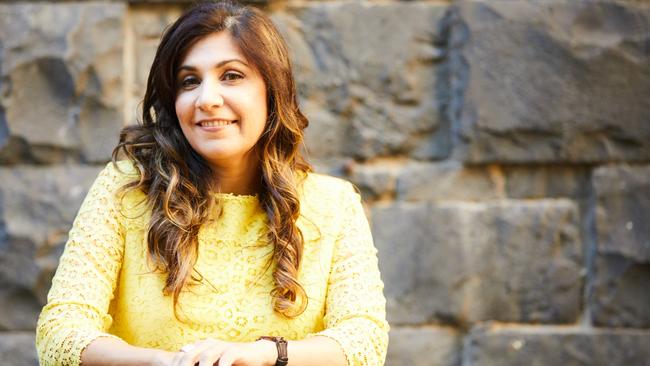The midlife crisis has been replaced by midlife transitions
The midlife crisis used to be a time of dread for women aged 45-55, but now it’s known as the midlife transition when change is more of an opportunity than a fear. Here are the women doing big things in their mid-40s.

VIC News
Don't miss out on the headlines from VIC News. Followed categories will be added to My News.
Australians, on the whole, are a happy bunch. Our sense of wellbeing is relatively consistent until the age of 45 to 55 when there is a noticeable dip, as charted in the annual Australian Unity Wellbeing Index.
Deakin University associate psychology professor Delyse Hutchinson says a key point about this age group is that the slump is greater among women.
“We’re interested to understand this dip and to find out why,” Hutchinson says.
“We don’t ask the participants in our study why their wellbeing dips but we can start to think of theoretical arguments about what happens.”
Midlife is often a time when people are at their most busy — raising children, consolidating careers and taking on more responsibilities, such as caring for ageing parents. There tends to be more financial strain from taking out loans, buying new cars and paying school fees.
“A lot of pressures can bear down on people at this time,” Hutchinson says.
“People are having children older and we’re taking care of our own parents. So there’s that dual caring load, which can be taxing.
“The other thing in the middle adult years is that it’s not just that people are struggling, it’s a time of transition and value change where people are often assessing their lives and thinking whether they have got to where they want to go.
“They ask, ‘What is important to me? I wanted the big house and the fancy car but now do I still want that?’ So there’s an increasing focus around purpose and meaning, which can cause friction for people to resolve. It’s a time when people can think about making a change.”
The Australian Unity Wellbeing Index has been surveying 2000 people annually across Australia for the past 20 years.
Melbourne mediator and collaborative practitioner Marguerite Picard, from family dispute resolution experts MELCA, says most of her clients are women aged 45 to 55.
Picard agrees that while the pressures increase on women at this age, it’s also a time when they yearn for more freedom, which can lead to more challenges in their relationships and lifestyles.
“Sometimes they sniff the wind and think it’s time to reshape their lives and careers,” she says.
“They see themselves as living a financially independent life. Many of our clients would say, two to five years down the track, they’re much happier and sometimes they say they’re living in a way that’s more true to who they are because they stopped compromising.
“I’ve had many women say that, rather than living in a financially well-off relationship, they’d rather live with less and have autonomy.
“Everyone says they lose sight of themselves. I know from many conversations that everyone contemplates separation for a long time before acting on it. Many women focus on getting their children through school, then live the life they wanted.”

CHRISTINE BESWICK
The job Christine Beswick had for 18 years was more than a great career.
It was a lifestyle, a social life, a sense of purpose and a great source of stimulation.
So, when she was made redundant in August 2010, she was devastated. “I honestly would have worked there for no money — that’s how much I loved my job,” Beswick, 63, says.
“We had such a cohesive team. We socialised, we worked really hard and we were all there for each other in pressured times at work or in our personal lives.”
Beswick, of Vermont, was 43 when she lost her husband after four years of illness. Three years later, her father died. She still had three sons to care for, one with severe physical and intellectual disabilities requiring constant home help at the time.
“I felt cast adrift and hurt,” she says.
“I had worked there for so long. I had to learn new skills such as resume writing and coping with job interviews. I still had children in primary school so I had to get another job.
“Even though people say they’re not ageist, I felt that was an issue and I could only get contract work.”
She looks back now and sees redundancies were on the horizon at the global IT company where she worked, with many jobs outsourced.
“I felt let down because I trusted the company,” she says. “I know business is business but I still felt very disappointed.”

Contract jobs over the next six years filled a gap but Beswick had lost her motivational spark when it came to work, so, when she turned 60, she made the decision to stop working.
Her disabled son went into supported accommodation in 2013, which was the same year her eldest son moved out of home and her other son began boarding at the University of Melbourne.
“In the space of six months, from having the house full of people all the time, all of a sudden they weren’t there and it was so quiet,” she says.
“There was just me and Graeme, my partner, which was great because we get on really well but I’m a very social person so, without work and my children, I felt I needed more outside stimulation.
“I’ve always thought that I’ve been really fortunate in my life. I don’t have a victim mentality.
Things have happened that I wish hadn’t happened but I deal and move on.”
She has not only moved on, she has flourished, embracing her 60s. She’s been on
a health kick this year, attending gym classes regularly and watching her diet.
She and Graeme have travelled the world and not always in a conventional way. They’ve embraced adventure travel, with trips to Antarctica, China and the Arctic, and next year they’re planning a holiday to Iceland and a Baltic Sea cruise. When they travelled to Africa two years ago, they built a kitchen at a primary school in Zimbabwe and have continued to support it financially.
“There are times I think I have more to give but the reality is that my career has passed now and I can see that being made redundant just sped everything up for me,” she says.
“I’m happy where I am. I’m still trying to find that thing that fulfilled me like work did but I know now that it’s somewhere (else). I’m happy to know that now.”

ANNE-MARIE CADE
The relationship between Anne-Marie Cade and her husband was at its lowest when they decided to separate three years ago.
They had been married for 25 years and the earlier years of their relationship, when they had similar interests and open communication, weren’t a strong enough memory to get them through the constant arguments.
“We were talking but not connecting in the sense that we decided to shut down,” Cade says.
“I felt there was not enough listening so I didn’t feel heard and I was tired. We weren’t being nice to each other. I felt I had to do a lot in the home and he felt he had a lot of responsibilities to keep the home fires burning so he felt there was too much pressure on him financially.
“Neither of us felt appreciated and it was becoming too toxic.”
Cade, 53, was a lawyer at the time, running her own firm, and her husband also ran his own business. They have three children — two boys aged 25 and 23 and a 16-year-old daughter.
The impact on their children was also a concern for the couple, who were born in Sri Lanka but settled in Caulfield.
They both have extended family in Melbourne but no one could help arrest their communication issues. She believes her high-pressure job, family commitments and increasing stress contributed to the marriage breakdown.
Her husband moved out and the various stages of grief gradually emerged for Cade.
“It was devastating,” she says.
“We’d known each other since we were 17 and my identity had merged with his so my confidence was affected terribly. More than anything else, I’d invested in this relationship so its breakdown affected me to the core.
“I had to rediscover myself but I had become more reliant on my husband than I anticipated. You don’t get married expecting to separate but no one tells you what it feels like when it ends.
“I had a sense of failure. You tend to blame yourself, then the other person and then you just blame everyone, which sets up a blame cycle.”
She sought help from psychologists and they tried counselling but nothing helped her out of her emotional slump. It made Cade question her chosen career specialising in family law and mediation.
However, a new horizon was emerging. In a quest to heal herself, she began a masters in family resolution and did many courses in conflict management and counselling, and delved deeper into mediation. Last year, she closed her law firm and expanded another business she had already set up on the side, Divorce Right, to be her main source of income.
“I went into the coaching space initially to coach myself back into thinking rationally
and responding rather than reacting, listening to what the other person has to say so you
can have a constructive conversation,” Cade says.
At the same time, she began meditating and learnt to enjoy her own company. She could even spend an entire day by herself, which was unheard of when she was married.
But recently she has been spending less time alone because she has reunited with her husband.
“This crisis transformed me totally,” Cade says.
“I’m a completely different person now and it’s also transformed my husband. I can really say our relationship has a new chapter now. The way we interact and communicate is so different. There is more openness, understanding and no judging.
“It’s actually very hard to trigger me now because I’m so aware of how my brain works.
I actually feel a great sense of empowerment now.”
MARISA LOMBARDI
Lipstick, in every shade of bright, was Marisa Lombardi’s trademark. She never
left the house without it, while leggings or tracksuits were strictly for indoors only.
So when she looked in the mirror one day in the middle of her treatment for breast cancer, the depth of her transition horrified her.
“It was a dark moment,” Lombardi says.
“I always took a lot of pride in the way I looked and I felt mutilated. I lost my hair, I only had one breast and I didn’t know who I was any more.”
Lombardi, 56, of Pascoe Vale South, had a free mammogram when she turned 50, not because she was experiencing any specific symptoms, but she’d received a notification in the mail and her three daughters insisted.
What was initially thought to be an 8mm lump was later found to be 14cm, requiring a mastectomy, removal of lymph nodes, six rounds of chemotherapy and five weeks of daily radiotherapy. Painful, complicated reconstructive surgery was also to come.
Having just been given the all clear this year, Lombardi says the trauma has turned her into a different person.
“At the moment, I’m the happiest I’ve ever been in my life,” she says.
“I’ve gone through divorce, which was messy, but now, if I want to say something, I don’t hold back. There isn’t time. This whole experience has made me so much stronger and appreciative of life as a precious gift.
“We truly don’t know if we’ll be here tomorrow so we need to live to the best of our ability and much of that is to be surrounded by people who make us happy.”
She feels so empowered by the experience she is keen to help other women going through breast cancer therapy and is working closely with the Treasure Chest support group.
“I really am a much more brave and courageous person now,” she says.
“I’m more positive and believe there’s always hope. I’m here to prove to people that you can survive this horrible disease and even be given a second chance. Some people don’t get a second chance but, because I have, I live my life to the fullest to be as happy as I can be.”


